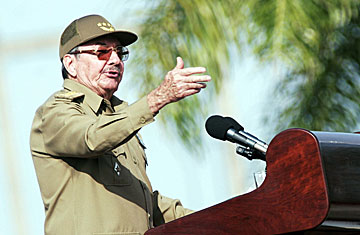
Raul Castro, Cuba's acting President, delivers a speech in honor of the 54th anniversary of the attack on the Moncada barracks.
Of all the long-winded speeches Cuban leader Fidel Castro has given each year, few were more anticipated (or longer-winded) than his address every July 26th, commemorating the anniversary of the 1953 attack on the Moncada military barracks that sparked his Cuban Revolution. So despite the fact that major stomach surgery forced Castro, 80, to disappear from public view shortly after last year's July 26 festivities — indeed, forcing him to hand provisional power to his younger brother and defense minister, Raul Castro — many thought he'd make every effort to shuffle from his sickbed and appear at the podium this year. The fact that he didn't, and that Raul made the speech instead, was the clearest sign yet that while Fidel may still be breathing, his rule has expired.
July 26 was always the day Fidel was at his most fiery and most defiant toward his archenemy, the U.S. The first such speech I ever covered, in 1990, was a more than three-hour outburst before hundreds of thousands at Havana's Plaza de la Revolucion, under a raging tropical sun that nearly melted my tape recorder. He proclaimed "Socialism or Death!" despite the fact that the Soviet Union's collapse had just plunged Cuba into an economic emergency that threatened the island with starvation. This week, Raul, 76, tried to hurl some of the old communist brimstone: Cuba, he said, is "set to continue confronting [the U.S.'s] policy of hostility, for another 50 years if that's what it takes." But Raul spent most of his far shorter address, delivered in the eastern city of Camaguey instead of the capital and to a comparatively smaller crowd, discussing technocratic economic details and the possibility of dialogue with Washington, which has imposed a trade embargo against Fidel's government for the past 45 years.
Those are hardly the kind of July 26 fireworks Cubans are used to. To many of his Cuban exile enemies in Miami, not seeing Fidel at the center of communist Cuba's equivalent of Independence Day seems proof positive that he is now a "dictator emeritus," as some are calling him. He might pen the occasional musing on U.S. imperialism, or be filmed every few months with Hugo Chavez or Chinese officials from his undisclosed convalescence site. But he's no longer planning to take the helm again, ever. Up to now he'd kept that question tantalizingly open — popping up in photos and videos, just when fans and foes alike were giving him up for dead, that suggested he was making a robust recovery and was still in control of his communist government's general direction if not its day-to-day operations. But not anymore, not after missing July 26. "His absence at his own most important holiday did leave a kind of feeling of closure," says one Miami exile leader. "But it's a mixed feeling, you know — glad that he's out of the picture, but sad that Raul will still be in charge."
Raul has long been considered Fidel's communist enforcer. But Cuba watchers also label him the more pragmatic and even more reform-minded brother. Still, his speech kept up the coy, vague reform rhetoric he's delivered since he took the reins last summer, an approach that's starting to make the Vatican look expeditious. He declared again that the regime has to address its notorious "deficiencies, errors and indolent bureaucratic attitudes" by "transforming conceptions and methods"; but he offered few if any significant details, which probably won't emerge until after Fidel does actually die. What Raul did offer was a fairly bleak economic picture, including a rare acknowledgment that Cuba's average $15-a-month wage is paltry and complaints that production of food staples like milk is little more than a third of what it ought to be. To his credit, he didn't talk about "socialism or death" but about a more mundane "combat for efficiency" — yet another hint, but just a hint, that he intends to pursue more of a quasi-capitalist, China-style economic model once he's on his own.
But that will be hard to do unless Cuba can get the U.S. to lift the embargo. Fidel had always used the embargo as a politically useful anti-Yanqui rallying cry, a convenient excuse for his economic failures. But for the far less charismatic Raul, the economic blockade is a more serious obstacle. As a result, Raul raised yet again the issue of extending an "olive branch" to the U.S., a notion that sounded as out of place at a July 26 speech as a toast to King George III would at a Fourth of July observance. Suggesting that Havana and Washington can talk once the exile-friendly Bush Administration leaves power in 2009, Raul said, "If the new U.S. authorities finally put aside the arrogance and decide to converse in a civilized way, it would be welcome."
To see such a U.S. thaw even after Bush, however, Raul will most likely have to demonstrate political as well as economic liberalization, something for which he's shown less enthusiasm so far. Raul, in fact, expressed his own July 26 triumphalism, suggesting the Bush Administration was frustrated because it had "wished for chaos to take hold and for Cuban socialism to collapse" since last summer. Socialism might not have collapsed yet in Cuba — but by taking the July 26 lectern this week, Raul made the strongest statement to date that Fidel's health has.
